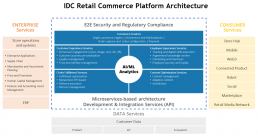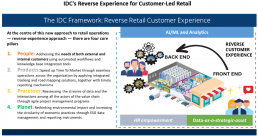The retail industry is a dynamic and ever-changing landscape that is constantly adapting to the needs of consumers and technological advancements. With the rise of omnichannel business models, retailers must cater to the demands of increasingly discerning customers who seek personalized experiences and convenient shopping options.
In this blog post, we will explore how retail commerce platforms (RCPs) are evolving to become instrumental in the seamless integration of the omnichannel customer journey and the personalization of the customer experience (CX) — both crucial for competitiveness in today’s retail industry.
The Retail Commerce Platform
The RCP is the backbone of retail operations, providing all the core capabilities that enable customer experience differentiation and seamless commerce. From customer experience to commerce services, employee experience, order fulfillment, and content optimization services, the platform is the key to success in today’s retail landscape.
Why the Retail Commerce Platform is Key for Today’s Retail Competitiveness
Customer experience is a top priority for retailers worldwide, and many feel the pressure to adopt experience-based business models. Through the RCP, retailers can prioritize investments in areas such as hyper-micro personalization and real-time contextual and immersive interactions and transform into CX-focused organizations to reinvent how omnichannel and headless commerce works. By combining commerce with interactive customer engagement, retailers can create more trustful lifetime valued connections with customers and associates, ultimately boosting sales.
The RCP enables retailers to focus on strategic planning, processes, programs, and technology-enabled-use cases, which IDC Retail Insights summarizes with the concept of Reverse Experience for Customer-Led Retail, to support today’s personalized and omnichannel customer journeys.
The RCP provides retailers with the tools to work on the 4Ps, or pillars, of the Reverse Experience for Customer-Led Retail, that is People, Products, Processes, and Planet, to address customer expectations (People), speed up time to market (Products), manage value-chain interactions (Processes) and ensure sustainable operations (Planet), and integrate the 4Ps through strategic planning.
Working with technology partners is key for retailers to advance their innovation journey aimed at the implementation of the essential capabilities, services, and innovative technologies of the RCP, to enable the Reverse Experience for Customer-Led Retail and take advantage of current and future market opportunities.
Unsurprisingly, retailers are moving rapidly toward RCP adoption. Over 60% of retailers globally have already implemented or are currently implementing the platform, while 33% plan to invest in it over the next 12 to 24 months, according to IDC’s 2022 Global Retail Operating Models Survey.
Key Trends in Today’s Retail Commerce Platform
But how is the RCP evolving? To answer this question, IDC Retail Insights assessed more than 20 RCP software and service providers. Here’s what we found out:
- Modern RCP frameworks are becoming more flexible and modular, allowing retailers to become more agile and adopt plug-and-play capabilities.
- Modern RCPs enable the seamless integration of front end (e.g., POS) with back-end operations (e.g., inventory management) for better omnichannel experience and operations management.
- Artificial intelligence (AI) capabilities continue to expand in RCPs to deliver better customer experiences and strengthen operations efficiency.
- There is continuous integration of RCP with systems including customer data platforms (CDPs) that help make the most of the extensive data pool available in today’s highly digitized retail operations.
Three Actions for Successful Commerce Platform Expansion
The RCP is essential for retailers to compete in today’s fast-paced environment and prepare for the future. By enabling piloting, implementing, and scaling innovation at speed, RCPs are the key to success in the retail industry. Retailers looking to adopt or expand their commerce platform’s capabilities should consider the following:
- Define a clear digital road map and accelerate RCP investments to achieve your company’s strategic objectives.
- Prioritize API and microservices-based architectures for the rapid expansion of the retail commerce platform’s capabilities and seamless integration with third-party services.
- Strengthen AI capabilities for customer experience personalization and omnichannel commerce orchestration, which are vital for today’s retail operations.
If you want to know more about how the RCP is evolving and what are the core offerings, strengths and challenges of RCP technology software and service providers, check out IDC MarketScape: Worldwide Retail Commerce Platform Software Providers 2023 Vendor Assessment and IDC MarketScape: Worldwide Retail Commerce Platform Service Providers 2023 Vendor Assessment. They are insightful research pieces that can help you stay up-to-date and develop your RCP implementation and expansion strategy.





